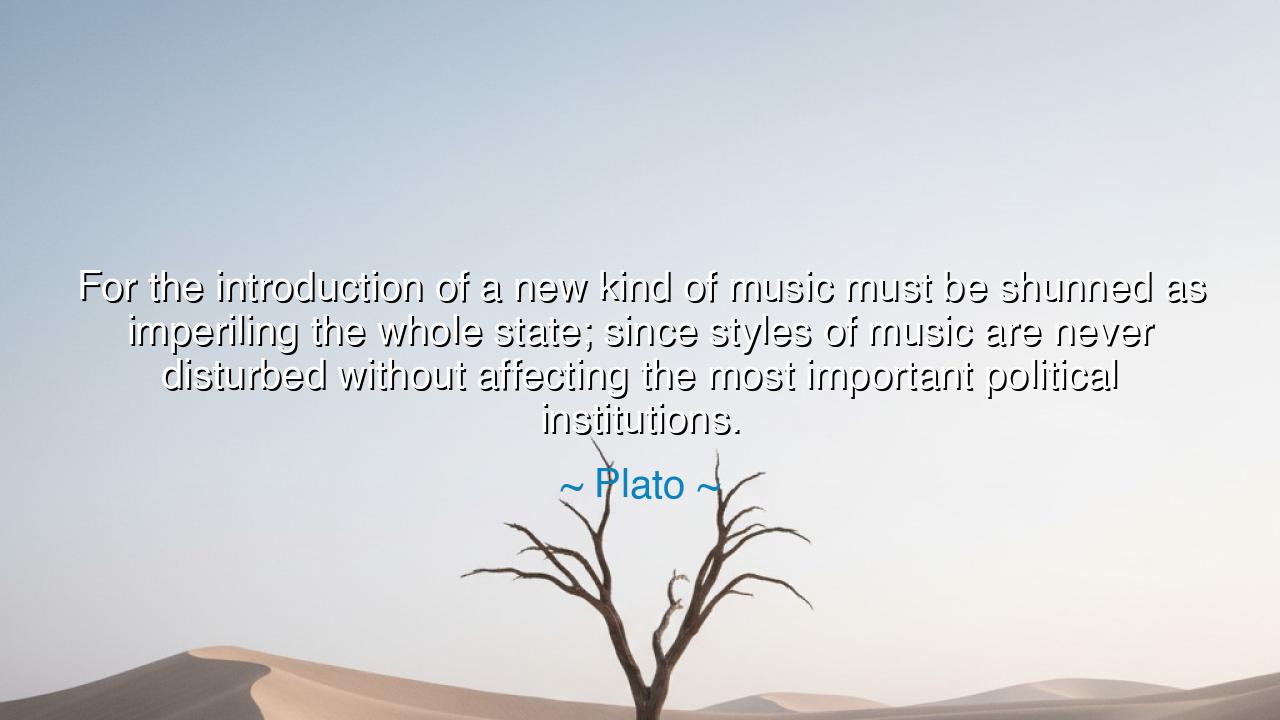
For the introduction of a new kind of music must be shunned as
For the introduction of a new kind of music must be shunned as imperiling the whole state; since styles of music are never disturbed without affecting the most important political institutions.






“For the introduction of a new kind of music must be shunned as imperiling the whole state; since styles of music are never disturbed without affecting the most important political institutions.” So warned Plato, the ancient philosopher, whose vision reached beyond the academy into the very soul of society. In these words he revealed a truth many dismiss: that music is not a trifle, not a pastime for idle hours, but a force that shapes men’s hearts, and through their hearts, the destiny of nations. For as the rhythm of music changes, so too do the rhythms of law, of virtue, and of power.
The origin of this saying lies in Plato’s teaching within The Republic, where he sought to design the perfect state. He perceived that the education of the young was the foundation of justice, and that music—by training the emotions, the spirit, and the soul—was the most powerful form of education. Thus he feared that if the music of a people became corrupt, undisciplined, or violent, then the citizens themselves would follow suit. Disorder in the harmony of song would soon give rise to disorder in the harmony of the state.
History testifies to this vision. Consider the French Revolution, when the fiery songs of the Marseillaise stirred the masses to courage and fury. A tune became a weapon, a melody became a sword. And when the old aristocracy trembled, it was not only the guillotine that felled them, but the power of voices singing together with one heart and one cause. Plato’s warning is clear: styles of music, when altered, do not remain in the theater alone—they march into the streets, into the courts, into the throne rooms, and overturn the world.
Even in modern times, the truth resounds. The rise of jazz and later rock and roll did more than transform art; they unsettled social orders, questioned moral codes, and gave youth a new banner of identity. Those in power feared these sounds because they sensed, rightly, that to change the music of a generation is to change its spirit. For music does not merely echo society; it shapes it, molds it, and sets its pulse. Plato saw this long ago, and his words remind us that music is a hidden lawgiver, wielding more authority than kings.
Yet this truth is not cause for despair but for vigilance. If music has power to corrupt, it also has power to elevate. Consider the hymns of the Civil Rights Movement in America, songs like We Shall Overcome. These were not simply melodies—they were weapons of peace, forging unity, courage, and moral clarity in the face of oppression. The political institutions of that age trembled, not because of violence, but because of song. Here Plato’s insight stands: the fate of a state is tied to the fate of its music.
The lesson, therefore, is profound: guard the music of your people. Do not consume sound without thought, for every note, every rhythm, every lyric carries seeds of virtue or corruption. Ask yourself: does this music strengthen justice, mercy, and courage? Or does it weaken discipline and truth? For what enters the ear soon enters the soul, and what fills the soul soon builds or destroys nations.
Thus let each one act wisely. Parents, teach children music that ennobles. Citizens, let your festivals resound with songs of unity, not division. Leaders, know that to guide a people you must also guide their harmonies. For Plato was right: when music is disturbed, the state itself trembles. But when music is noble, just, and pure, it becomes a fortress for the spirit, a guardian of law, and a beacon for generations yet unborn.
So let Plato’s words endure: “Styles of music are never disturbed without affecting the most important political institutions.” Take them as both warning and hope. For though music may bring ruin if corrupted, it may also bring renewal if kept in harmony with truth. Let us then not only hear music, but heed it, shaping it with wisdom, so that through it, the state itself may remain strong and righteous.






AAdministratorAdministrator
Welcome, honored guests. Please leave a comment, we will respond soon